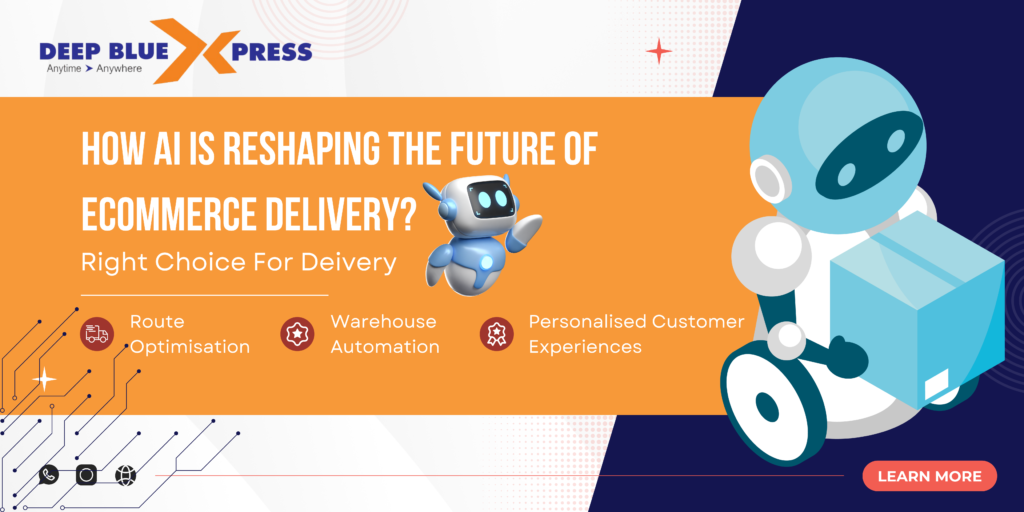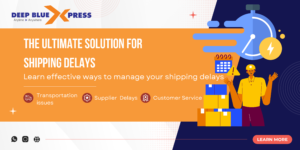The eCommerce sector is constantly evolving, seeking for methods to streamline operations and improve customer experiences. Artificial intelligence (AI) is one of the most remarkable developments that is transforming this industry.
AI is a game changer that has revolutionised the way things are delivered to customers. It has ushered in a new era of productivity and client-centricity, from forecasting customer preferences to automating operations with route planning tools.
International Courier Management Software (ICMS) and other route planning technologies have helped to streamline eCommerce delivery procedures. They use AI algorithms to ensure that items are delivered to clients via cost-effective methods.
So, join us on this journey as we explore the world of AI-powered eCommerce delivery and its impact on businesses and consumers alike.
The current situation of eCommerce Delivery
Conventional delivery methods are being scrutinised in the ever-changing eCommerce industry. Traditional methods involve several phases, from order placement to dispatch and final delivery. These approaches register obstacles such as last-mile delivery complexities, congested metropolitan areas, and rising customer demands.
Furthermore, as the eCommerce sector grows, the demand for faster and more efficient delivery services rises. Clients want prompt deliveries as well as flexibility in delivery alternatives, such as same-day or even same-hour delivery.
This allows for further investigation into how AI-powered solutions are altering the delivery landscape.
What is Artificial Intelligence (AI) in eCommerce Delivery?
AI is the driving force behind the change of eCommerce delivery. AI uses complex algorithms and machine learning to automate several steps of eCommerce delivery. This automation helps to improve operational efficiency and enhance consumer experiences.
The eCommerce delivery routes are optimised based on real-time traffic data, atmospheric conditions, and client preferences. It also allows predictive analytics to accurately forecast demand and inventory requirements, reducing the danger of stockouts or overloading.
In addition, artificial intelligence personalises client interactions by providing delivery times and specific recommendations. This mix of advancements enables eCommerce enterprises to meet the expectations of modern buyers by delivering both bundles and great experiences.
AI-powered solutions for eCommerce delivery
Artificial intelligence (AI) has ushered in a new era of innovation, transforming how items are delivered, transported, and received. Let’s look at how AI is changing the scene in a variety of ways:
(1) Route Optimisation: Artificial intelligence algorithms are at the forefront of optimising delivery routes to achieve unprecedented efficiency. It uses real-time data such as traffic conditions, weather forecasts, and even bundle size to plot the most efficient and cost-effective routes.Predictive Analytics: AI’s predictive analytics capabilities extend to evaluating client behaviour and delivery trends. AI frameworks can predict when and what clients will order by analysing large databases.These insights help with demand forecasting, allowing organisations to stock inventory more precisely, reduce waste, and reliably meet surges in demand. Amazon’s anticipatory delivery approach demonstrates AI’s predictive skills by moving things to regional hubs before customers submit orders.
(2) Warehouse Automation: Artificial intelligence-driven robots and automation have changed warehouse operations. These robots roam distribution centres, locate things, and bring them to human workers for packing and delivery. Organisations such as Alibaba’s Cainiao Smart Logistics Network employ over 100,000 AI-powered robots in its fulfilment centres, increasing productivity, reducing errors, and reducing the pressure on human labour.
(3) Personalised Customer Experiences: Artificial intelligence (AI) helps to improve both operational efficiency and customer experience. The clever algorithms make personalised product recommendations based on the customer’s tastes, previous purchases, and browsing history. Real-time delivery estimates help keep customers informed. Furthermore, the amount of personalisation improves customer happiness and conversion rates, making AI a significant tool for eCommerce deliveries. To summarise, integrating AI-powered solutions into eCommerce deliveries improves efficiency, customer satisfaction, and operational excellence.
Benefits of Artificial Intelligence in eCommerce Delivery
Artificial intelligence (AI) is altering eCommerce delivery, and its advantages are multifaceted:
- AI has played a critical role in revolutionising eCommerce deliveries through optimal routing. The use of AI-driven algorithms in eCommerce assures that firms attain operational efficiency while incurring minimal costs. AI-powered solutions enable organisations to provide flexible delivery alternatives, such as same-day and within-hours delivery. This adaptability helps to satisfy changing customer preferences, ensuring a great customer experience.
- AI has played a critical role in revolutionising eCommerce deliveries through optimal routing. The use of AI-driven algorithms in eCommerce assures that firms attain operational efficiency while incurring minimal costs.
- AI-powered solutions enable organisations to provide flexible delivery alternatives, such as same-day and within-hours delivery. This adaptability helps to satisfy changing customer preferences, ensuring a great customer experience.
- Predictive analytics backed by AI assists eCommerce businesses in optimising their stock levels. AI systems can accurately forecast inventory requirements by analysing demand trends and historical data. It helps firms prevent overstocking and stockouts, allowing them to satisfy client requests more efficiently.
- Using AI to optimise eCommerce delivery routes improves resource management efficiency. Businesses that follow optimised routes can not only save money on operations, but also contribute to a more economical and environmentally responsible delivery ecosystem.
Thus, incorporating artificial intelligence (AI) into eCommerce delivery streamlines operations and equips organisations to thrive in an undeniably competitive online economy, all while providing higher value to customers.
Future Trends for AI and eCommerce Delivery
The future of eCommerce shipping promises intriguing possibilities as technology advances. Several significant technology advancements influencing the future of eCommerce delivery include:
- Drones and autonomous delivery vehicles
As technology advances, the rules governing drones and driverless cars are expected to evolve. This invention is expected to enable more precise and speedier delivery, particularly in metropolitan or urban areas with congested traffic.
Furthermore, drones and autonomous vehicles provide delivery precision and speed, reducing package transit time. This innovation aligns with the growing demand for more efficient and timely eCommerce deliveries, which increases consumer loyalty. The future of eCommerce shipping promises intriguing possibilities as technology advances.
- AI-driven client chatbots
Customer chatbots powered by artificial intelligence are transforming the way customers interact with eCommerce. Apart from simply responding to consumer requests, these chatbots have now expanded to deliver personalised item recommendations, hence increasing the client experience.
Aside from that, consumers may follow the status of their deliveries in real time, keeping them informed about the whereabouts of their goods. This integration of AI into customer care has several benefits, including time savings and a more efficient manner for eCommerce businesses to communicate with their customers.
- Predictive Maintenance
The predictive maintenance powered by artificial intelligence is proving to be critical for eCommerce delivery. Artificial intelligence (AI) uses data from vehicle usage patterns to monitor vehicle health and performance and predict maintenance needs.
Furthermore, this method assists firms in ensuring that cars remain in good condition, lowering the likelihood of unexpected failures or service disruptions. Overall, predictive maintenance solutions can enhance the consistent quality and efficacy of their delivery operations, resulting in better client experiences.
- Initiatives that promote sustainability
Sustainability is one of the growing challenges in the eCommerce market, and AI is playing an important part in tackling it. Online businesses have also begun to use sustainable practices, such as optimising delivery routes to save fuel consumption and using eco-friendly packing materials.
The optimised routes enabled by artificial intelligence contribute to reducing the environmental impact of delivery operations, harmonising with client demands for eco-friendly solutions. These practices indicate firms’ commitment to sustainability and its role in decreasing environmental impact.
- Blockchain enables transparency
Blockchain technology provides an opportunity to improve transparency in eCommerce deliveries. It maintains an unalterable record of product origin and authenticity. Aside from that, blockchain allows customers to track their orders along the supply chain, from manufacture to final delivery.
This amount of transparency gives customers a sense of assurance about their purchases, which builds trust. To summarise, blockchain is poised to transform how businesses and purchasers perceive and communicate, ushering in an era of transparency and accountability.
These trends reflect a future in which AI-driven advancements in eCommerce delivery are ready to provide comfort, reliability, and sustainability, fundamentally influencing how things are delivered to customers.
Conclusion
Finally, the incorporation of artificial intelligence (AI) into eCommerce delivery procedures has a significant impact. Artificial intelligence has weaved an embroidery of effectiveness and personalisation into the realm of online commerce, from improving delivery routes to anticipating client preferences.
Furthermore, the benefits of artificial intelligence in this field are obvious: lower costs, faster processing, and higher consumer loyalty. Beyond these immediate benefits, artificial intelligence-driven eCommerce delivery is charting a reasonable and client-driven path forward, promising eco-friendly practices, personalised experiences, and unparalleled comfort.




